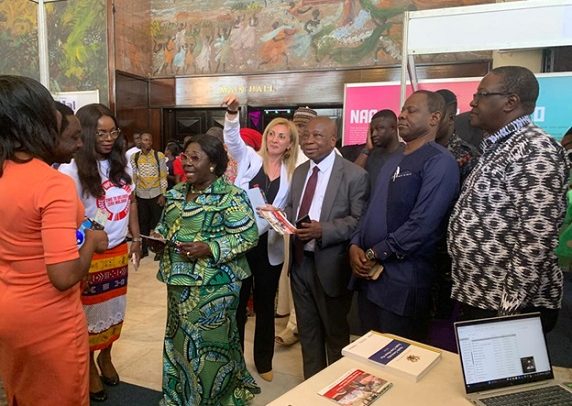Dignitaries at the exhibition stand
President of the National House of Chiefs and Omanhene of Sehwi Anhwiaso traditional area, Ogyeahoho Yaw Gyebi II, has called for the allocation of one per cent of mineral royalties towards the elimination of malaria in the country.
He indicated that apportioning one per cent of the royalties that go to the Mineral Development Fund for the fight against malaria would shore up domestic revenue mobilization.
“Mineral Development Fund should allocate at least one percent of the funding from mineral royalties and distribute across the country to help fight malaria,” he said.
Ogyeahoho Yaw Gyebi II was speaking at the commemoration of the World Malaria Day in Accra yesterday on the theme, “Time To Deliver Zero Malaria; Invest, Innovate. Implement.”
He extended the call to the Chamber of Mines urging the institution to whip-up its members to make a contribution in their respective areas of operation to the malaria fight.
“We have mining in almost every part of the country and we can generate funds for malaria fight from the mining companies,” he added.
World Health Organisation (WHO) country representative, Dr. Francis Kasolo, said there was a need for adequate and predictable financing to sustain progress made by countries such as Ghana in the fight against Malaria.
“The funding gap for the global fight against Malaria has unfortunately widened over the past three years with a current shortfall of US$ 3.8 billion in global malaria financing in 2021. We need therefore to continue mobilizing domestic resources if we are to sustain Ghana’s Malaria elimination agenda,” he stressed.
Dr. Kasolo further stated that the overall Malaria elimination in Ghana should be built on a strong and resilient health system that is delivered on a platform of primary health care (PHC).
Malaria Vaccine
In relation to vaccines, he said the country together with Kenya and Malawi have been piloting the first WHO approved malaria vaccine the RTS,S malaria vaccine reaching more than 1.3 million children with at least 1 dose of this vaccine to date.
In addition to the RTS,S vaccine the Ghana Food and Drug Authority (FDA) recently registered a second Malaria vaccine the R21 vaccine.
“Although this vaccine is still undergoing evaluation by the WHO Strategic Advisory Group of Experts, WHO would welcome a second safe and efficacious malaria vaccine to complement the roll-out of the first malaria vaccine, RTS,S/AS01 (RTS,S).
This could help close the sizable gap between supply and demand and further reduce child illness and death from malaria,” he said.
Partnership
Chief of Staff, Akosua Frema Osei-Opare, addressing the gathering as the special guest said a multi-sectorial engagement is key, since malaria cannot be eliminated by the work of the Ministry of Health alone.
“The role of the leadership is key to this, thus I like to affirm my commitment to support in the multisectoral engagement,” she announced.
Minister of Health Kwaku Agyeman-Manu in his remarks said beyond engagement and participation in the development of the National Malaria Elimination Strategic Plan (NMESP), “we need all sectors to plan, budget and commit resources to this fight, not only because we are all affected by malaria, but also for the synergism and desirable impact it promises to achieve in our fight.”
Malaria Cases
Director General of the Ghana Health Service, Dr. Patrick Kuma-Aboagye said deaths due to malaria have decreased by 53 per cent from 333 in 2019 to 151 in 2022.
“Malaria prevalence has decreased from 14.1 per cent in 2019 to 8.6 per cent in 2022, testing rate has increased from 94% in 2019 to 98 per cent in 2022. Proportion of admission attributed to malaria decreased marginally from 21.3 per cent in 2019 to 21.0 per cent in 2022,” he said.
Dr. Kuma-Aboagye said the proportion of confirmed OPD malaria cases decreased from 21.5 per cent in 2019 to 19.4 per cent in 2022.
“Proportion of pregnant women who have taken the at least three doses of Sulphadoxine Pyrimethamine for prevention of malaria in pregnancy (IPTp) has increased from 48.2% in 2019 to 60.1% in 2022,” he said.
By Jamila Akweley Okertchiri

